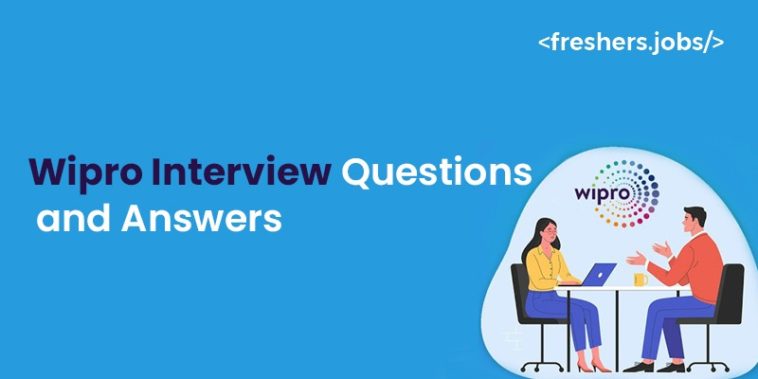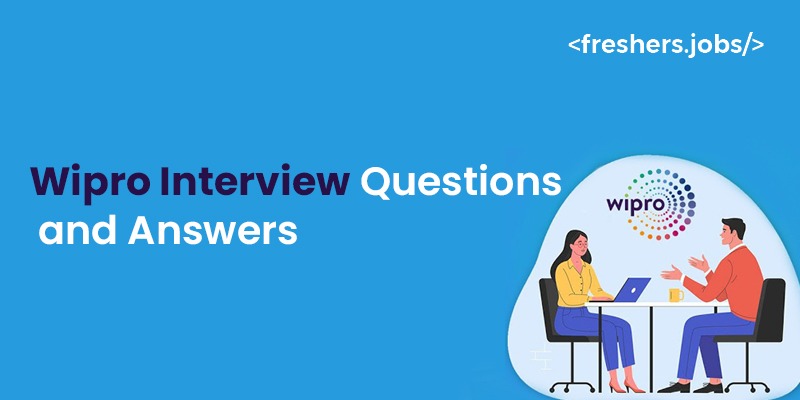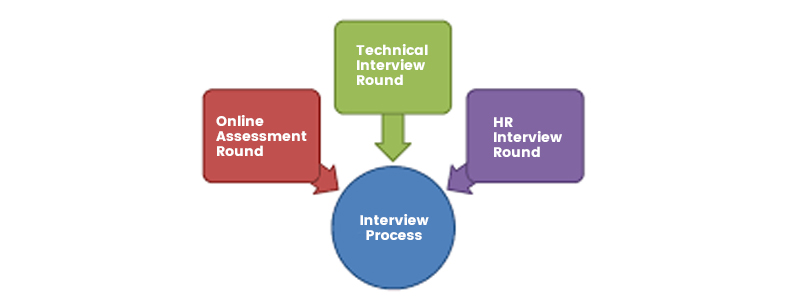Wipro Limited stands as a prominent global player in the field of information technology, consulting, and business process services. Wipro involves cutting-edge technologies such as cognitive computing, hyper-automation, cloud computing, analytics, and robotics to empower its clients to navigate the digital landscape effectively. With a workforce consisting of 200,000 dedicated professionals serving clients across six continents, Wipro is recognized worldwide for its comprehensive service offerings, unwavering commitment to sustainability, and stellar corporate citizenship.
Wipro’s workplace is both dynamic and inspiring for freshers jobs seekers, characterized by its blend of growth prospects, a culture of ongoing creativity and innovation, equitable practices, and a thriving work environment. What sets wipro company apart is its commitment to providing every employee with the freedom to learn, evolve, and carve out their unique career journey. This principle reflects an organization without limits, where the belief in the power of people and their innovative capabilities is the driving force behind achieving operational excellence. Wipro offers various job vacancies for freshers. Interested Candidates can click on Wipro Jobs For Freshers to apply for diverse job positions that are relevant to their skills and abilities.
Interview Process
The standard Wipro Interview Process usually involves three selection rounds:
- Online Assessment Round: The online assessment round in the Wipro recruitment process typically involves a series of tests and assessments designed to evaluate the skills and qualifications of candidates applying for various positions within the company.
- Technical Interview Round: The technical interview round in the Wipro recruitment process is an important step in evaluating a candidate’s technical skills and knowledge relevant to the specific role they are applying for.
- HR Interview Round: The HR interview round in the Wipro recruitment process is typically the final stage of the interview process and focuses on assessing your soft skills, personality, cultural fit, and overall suitability for the organization.
Interview Rounds
Online Assessment Round
The initial stage of the recruitment process is the online assessment test, followed by the technical interview rounds for candidates who successfully pass this phase. The assessment test comprises three distinct sections:
Aptitude: The Aptitude Test is the initial part of the Online Assessment Round, and it consists of 3 sections:
- Quantitative Aptitude: In this section, candidates will go through a mathematical assessment in which the wipro interview questions asked relevant to topics like Time, Speed and distance, Number Series, Simple and compound Interest, Probability, Permutation and combination, Ratios and proportions, and Percentages within the Quantitative Aptitude section.
- Logical Reasoning: This section of the assessment aims to evaluate the candidate’s capacity for critical thinking and logical thinking. It will involve questions related to the following areas: Coding, Decoding, Series, Analogy, Visual Reasoning, Data Sufficiency/ Interpretation/ Arrangements, Logical Word Sequence, Statements and Inferences, and Inequalities.
- Verbal Ability: In this segment, candidates will undergo an evaluation of their English language proficiency. The questions in this section will primarily revolve around error-spotting, Sentence Improvement, Sentence Completion, and Para-Jumbles, among other relevant subjects.
Essay writing: This section incorporates an Essay Writing segment, where the interview questions for freshers may focus on diverse topics or situations. Candidates are required to compose a 200-400 word essay on the given subject. This examination is conducted in a computer-based format. A high-quality essay for Wipro should encompass the following elements: Careful planning, accurate language usage, and a rich vocabulary.
Coding: Candidates have the flexibility to opt for their preferred programming language from the following options: Java, C, C++, or Python when taking the coding assessment. It is essential for candidates to demonstrate a strong grasp of fundamental programming concepts in at least one of these languages. Typically, this round consists of two to three coding questions. The key topics that candidates should be proficient in include Decision Making, Looping, Functions, Arrays, and Strings. Are you in search of job opportunities in Chennai? Then you can look for job openings available in that city. Click fresher job openings in Chennai to find job roles that are relevant to your skills and abilities.
Technical Interview Round
- Candidates who successfully clear the online assessment round will be invited to participate in in-person technical interviews.
- During a technical interview, your technical skills are assessed. Typically, the interview questions for freshers will be related to the specific technical knowledge required for the position you’ve applied for. The questions posed in these interviews are designed to evaluate your problem-solving abilities and numerical reasoning skills. Interviewers are keen on understanding how candidates approach challenges, articulate their thought processes, and demonstrate personal attributes like effective communication, in addition to assessing their technical expertise, which is of paramount importance.
- The number of technical interviews to be held will depend on factors such as your performance in preceding rounds, the specific job opportunity, and the company’s prerequisites.
- The face-to-face technical interview stands as the pivotal stage in the process. It is important to have a solid understanding of computer fundamentals such as OOPS, DBMS, CN, and OS and the ability to articulate them to the interviewer. Proficiency in at least 1 programming language is essential. You don’t need to master every language, but you should have a working knowledge of at least one, such as C++, Python programming, or Java.
HR Interview Round
Each company carries out an HR interview round to evaluate your personality, strengths, weaknesses, task-handling capabilities, and suitability for the position. This round is also used to delve into your background and ascertain whether you are a suitable match for the role. The HR interview is conducted for candidates who have successfully passed the technical interview. It may also encompass questions about the history of Wipro, including its founding, objectives, values, and organizational framework, among other aspects. Review your resume to verify the inclusion of all pertinent details about yourself and ensure the accuracy of the information to the best of your knowledge. Some frequently asked hr questions are listed below.
- Could you please tell me about yourself?
“I am a recent graduate with a [your degree] from [your university/college name]. My academic background has provided me with a solid base in [ relevant subjects or skills]. During my time at [internships or projects], I had the opportunity to [briefly describe key achievements or responsibilities]. I am passionate about [field of interest or industry] and eager to apply my knowledge and enthusiasm to a professional setting. I am a quick learner, a strong team player, and I thrive in challenging environments”.
- What are your expectations regarding this position?
My primary expectation for this position is to gain valuable hands-on experience in [field or industry relevant to the job]. As a recent graduate, I’m eager to apply the knowledge and skills I’ve acquired during my academic journey to real-world situations. I hope to learn and grow within the company, taking on responsibilities that allow me to contribute effectively”.
- Why do you want to work at Wipro?
“I’m keen to work at Wipro for several reasons. Wipro has a stellar reputation in the IT industry for its commitment to innovation and excellence. I believe that being a part of such a renowned organization will provide me with an excellent platform to learn and grow in the field of technology”.
- Could you please tell me about your internships and projects?
During my academic journey, I actively look for opportunities to gain practical experience and apply the knowledge I acquired in the classroom. I completed [mention the number] internships and worked on [ mention the number] significant projects that have shaped my skills and understanding. One of my most noteworthy projects was [describe a relevant project]. In this project, I was tasked with [briefly explain your role and responsibilities]. Through this experience, I not only honed my technical skills but also developed strong problem-solving abilities and learned the importance of teamwork. In addition to that, I interned at [mention the company/organization], where I [briefly describe your responsibilities and achievements during the internship]. This internship exposed me to real-world industry practices and allowed me to work alongside professionals who provided mentorship and guidance.
Technical Interview Questions
Let’s discuss the interview questions for freshers with answers in the Technical round in Wipro.
- What factors contribute to the increased speed of a macro compared to a function in the C programming language?
Macros in a program are designated portions of code that are assigned a specific name. When the compiler encounters this name, it replaces it with the actual piece of code. You can establish a macro using the ‘#define’ directive, and it can be defined either outside or within the main method.
Code 1:
#include <stdio.h>
int main() {
const int HRS = 24; // Constant variable
printf(“%d”, HRS);
return 0;
}
Output:
24
In the provided code, a macro named “HRS” has been defined with a value of 24. When this macro is invoked within the printf function, it results in the output of “24” in the terminal. The code provided can be rewritten without using macros as follows:
Code 2:
#include <stdio.h>
int hrs() {
return 24;
}
int main() {
printf(“%d”, hrs());
return 0;
}
Output:
24
In this code, we’ve defined a function called “hrs.” When we invoke the “hrs” function within the printf function, the function returns the value 24, which is then printed on the output terminal.
It’s worth noting that macros are processed during the pre-processing phase, meaning they are resolved before the code is compiled. On the other hand, functions are processed during the compilation phase, which occurs after the pre-processing phase.
Let’s look into some Differentiation and Comparison interview questions for freshers in Wipro.
- Differentiate between Object-oriented programming language and Object-based programming language?
Here are the key distinctions between object-oriented and object-based languages:
- Object-oriented languages fully embrace all Object-Oriented Programming (OOP) concepts, including inheritance, polymorphism, and more, whereas object-based languages may not implement all of these OOP principles.
- Object-oriented languages typically lack built-in objects, while object-based languages often include predefined objects. For instance, JavaScript features a built-in window object.
- Examples of object-oriented programming languages are Java, C#, Smalltalk, and others, while object-based languages encompass JavaScript, VBScript, and similar languages.
Object-oriented languages adhere to OOP principles comprehensively, while object-based languages may offer partial OOP support and often come with built-in objects. Examples illustrate the distinction between these language categories.
- Compare Aggregation vs. Composition in Java.
An association refers to a connection established between two separate classes through their respective objects. This connection can take the form of one-to-one, one-to-many, many-to-one, or many-to-many relationships.
In Object-Oriented programming, objects interact with one another to make use of the functionalities and services offered by those objects. Associations can manifest in two distinct forms: Composition and Aggregation.
Aggregation represents a distinct type of association characterized by the following traits:
- It signifies a “Has-A” relationship.
- It is a one-way relationship or a unidirectional association.
- In aggregation, both entities can exist independently, meaning that terminating one entity will not impact the other.
Composition is a form of Aggregation in which two entities have a high level of interdependence.
- It denotes a part of a relationship.
- In Composition, both entities depend on each other.
- When two entities combine to create a composition, the composite object is inseparable from the other.
In conclusion, preparing for a Wipro interview can be a challenging yet rewarding experience. We’ve explored some common interview questions for freshers and provided insightful answers to help you ace your interview with this renowned IT company. Remember that while specific questions may vary depending on the job opportunity you’re applying for, these general guidelines and responses can serve as a valuable foundation.





